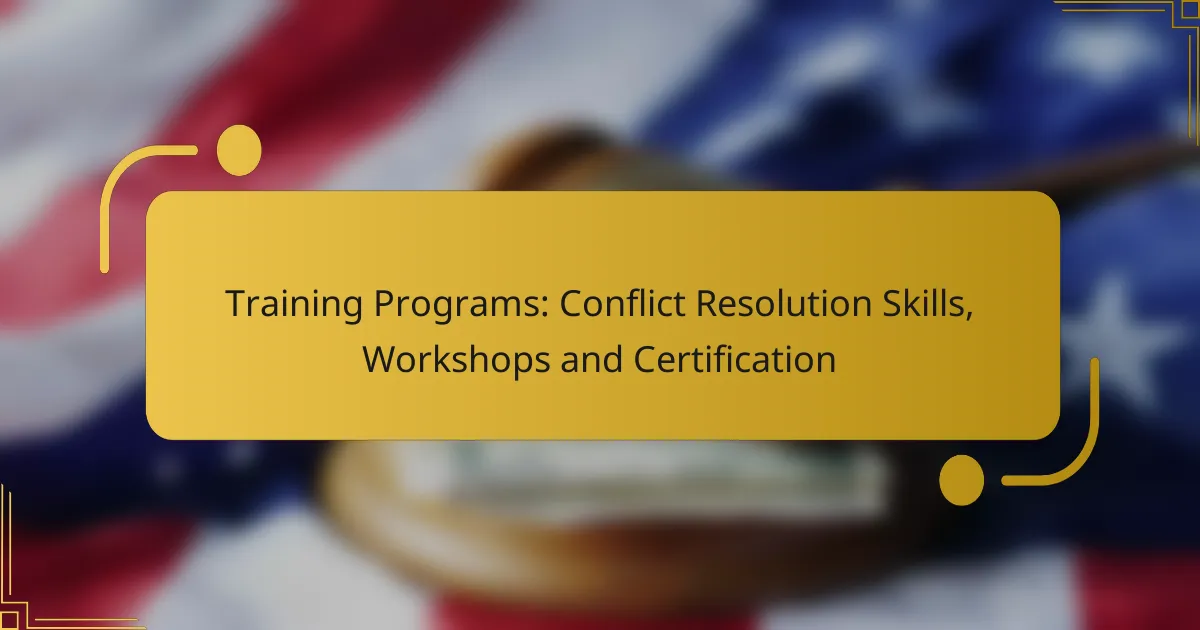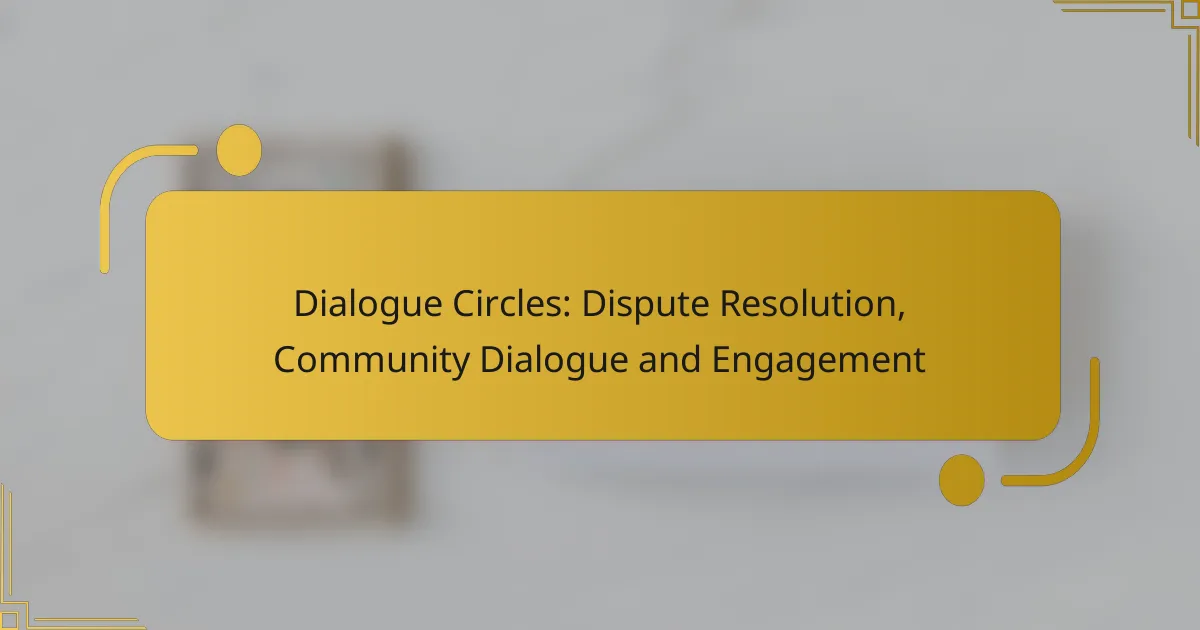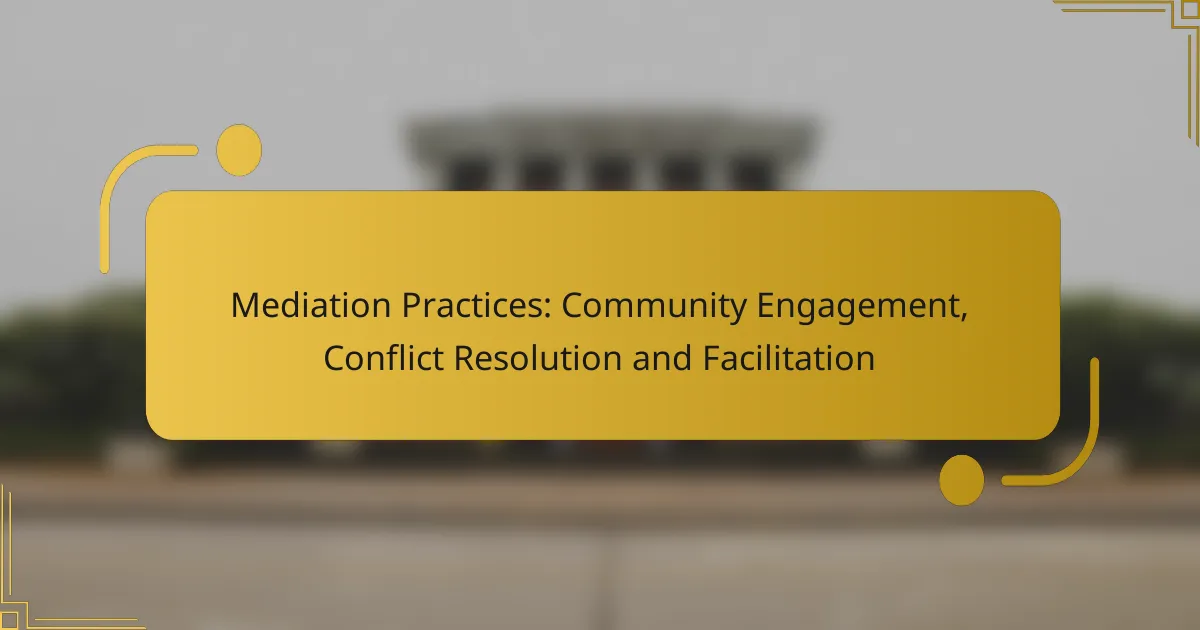Negotiation skills are essential for fostering understanding and cooperation in diverse urban communities, enabling effective conflict resolution. By employing strategies such as active listening and emotional intelligence, negotiators can address underlying issues and achieve mutually beneficial outcomes while maintaining strong relationships.
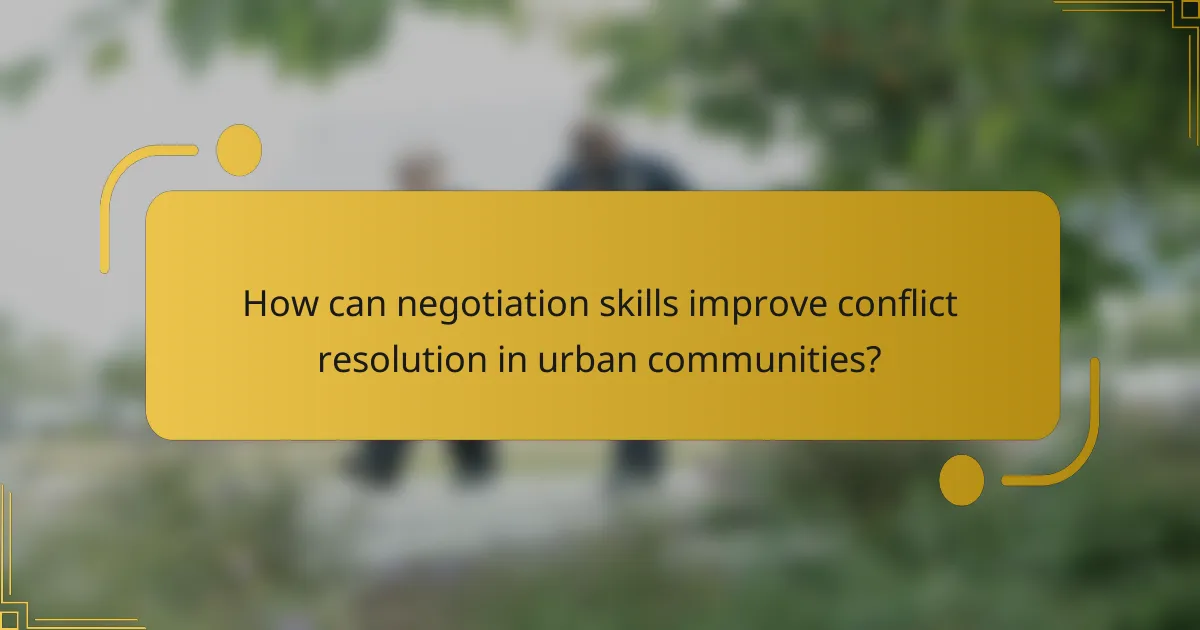
How can negotiation skills improve conflict resolution in urban communities?
Negotiation skills can significantly enhance conflict resolution in urban communities by fostering understanding and cooperation among diverse groups. Effective negotiation helps to address underlying issues, leading to sustainable solutions that benefit all parties involved.
Enhanced communication techniques
Effective communication is crucial in negotiation, especially in urban settings where diverse perspectives exist. Techniques such as active listening, clear articulation of needs, and non-verbal cues can bridge gaps between conflicting parties. For instance, using open-ended questions encourages dialogue and allows for deeper exploration of issues.
Practicing reflective listening, where one paraphrases what the other party has said, can also clarify misunderstandings and demonstrate empathy. This approach can reduce tensions and create a more conducive environment for resolution.
Building trust among stakeholders
Trust is a foundational element in successful negotiations. In urban communities, building trust involves consistent and transparent communication, as well as follow-through on commitments. Stakeholders should engage in small agreements to establish reliability before tackling larger issues.
Creating opportunities for informal interactions, such as community meetings or social events, can also strengthen relationships. When stakeholders feel valued and understood, they are more likely to collaborate effectively during negotiations.
Facilitating collaborative problem-solving
Collaborative problem-solving encourages all parties to work together towards a common goal, rather than viewing each other as adversaries. This approach involves brainstorming sessions where participants can share ideas freely and explore various solutions. For example, using a structured framework like the Interest-Based Relational Approach can guide discussions towards mutual interests.
It is essential to establish ground rules for these sessions to ensure respectful dialogue and equal participation. By focusing on shared objectives, urban communities can transform conflicts into opportunities for growth and cooperation.
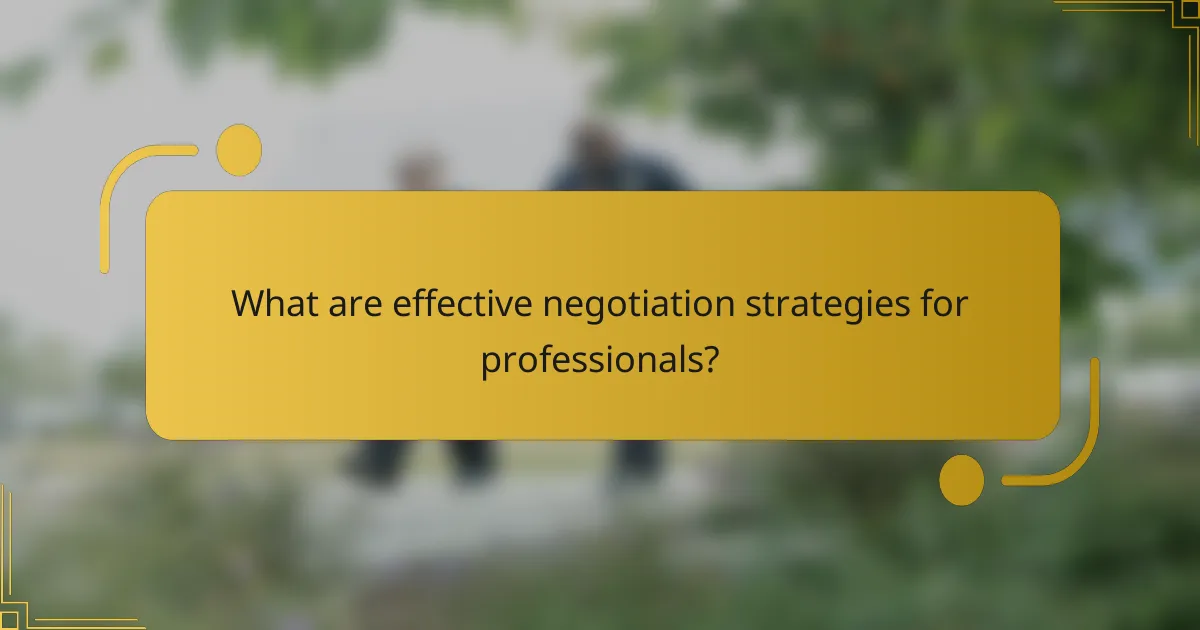
What are effective negotiation strategies for professionals?
Effective negotiation strategies for professionals focus on achieving mutually beneficial outcomes while maintaining strong relationships. Key strategies include understanding interests, preparing alternatives, and employing principled approaches to discussions.
Interest-based negotiation
Interest-based negotiation centers on identifying the underlying interests of all parties involved rather than just their positions. This approach encourages open communication and collaboration, allowing negotiators to explore creative solutions that satisfy the needs of both sides.
To implement interest-based negotiation, start by actively listening to the other party’s concerns and motivations. Use questions to uncover their true interests and share your own openly. This can lead to innovative compromises that may not have been considered initially.
BATNA (Best Alternative to a Negotiated Agreement)
BATNA refers to the best alternative option available if negotiations fail. Knowing your BATNA empowers you to negotiate confidently, as it provides a clear threshold for what you are willing to accept.
Before entering negotiations, assess your alternatives and determine their value. This preparation allows you to make informed decisions during discussions and avoid agreeing to unfavorable terms. A strong BATNA can significantly enhance your negotiating position.
Principled negotiation
Principled negotiation, developed by Fisher and Ury, focuses on four key principles: people, interests, options, and criteria. This method emphasizes separating people from the problem, focusing on interests rather than positions, generating options for mutual gain, and using objective criteria for decision-making.
To practice principled negotiation, ensure that discussions remain respectful and constructive. Aim to create a variety of options before deciding on a solution, and rely on fair standards to evaluate those options. This approach fosters collaboration and helps maintain positive relationships even in challenging negotiations.
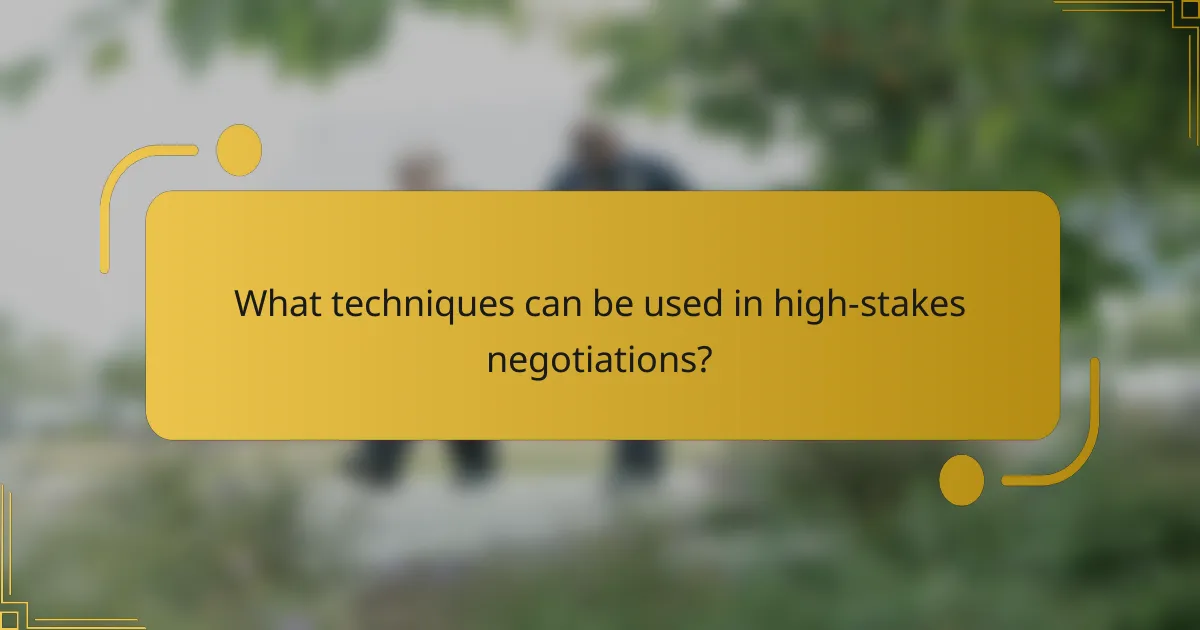
What techniques can be used in high-stakes negotiations?
High-stakes negotiations require specific techniques to navigate complex dynamics and achieve favorable outcomes. Key strategies include active listening, emotional intelligence, and effective framing to ensure all parties feel heard and understood.
Active listening
Active listening is crucial in high-stakes negotiations as it fosters trust and understanding. This technique involves fully concentrating on the speaker, acknowledging their points, and responding thoughtfully. By demonstrating that you value the other party’s perspective, you can create a more collaborative atmosphere.
To practice active listening, maintain eye contact, nod in agreement, and paraphrase what the other party has said to confirm understanding. Avoid interrupting and resist the urge to formulate your response while they are speaking. This approach can significantly enhance the negotiation process.
Emotional intelligence
Emotional intelligence (EI) is the ability to recognize and manage your own emotions, as well as those of others. In negotiations, high EI helps you navigate emotional triggers and respond appropriately to the feelings of others. This skill can lead to better rapport and more effective communication.
To improve your emotional intelligence, practice self-awareness by reflecting on your emotional responses during negotiations. Additionally, observe non-verbal cues from others to gauge their emotional state. Being attuned to these signals allows you to adjust your approach and foster a more productive dialogue.
Framing and reframing
Framing and reframing involve presenting information in a way that influences perception and decision-making. In high-stakes negotiations, how you frame an issue can significantly impact the other party’s response. By strategically highlighting certain aspects, you can steer the conversation toward more favorable outcomes.
For example, instead of presenting a proposal as a cost, frame it as an investment that will yield long-term benefits. If faced with resistance, reframe objections as opportunities for collaboration. This technique can help shift the focus from conflict to mutual gain, enhancing the likelihood of a successful negotiation.
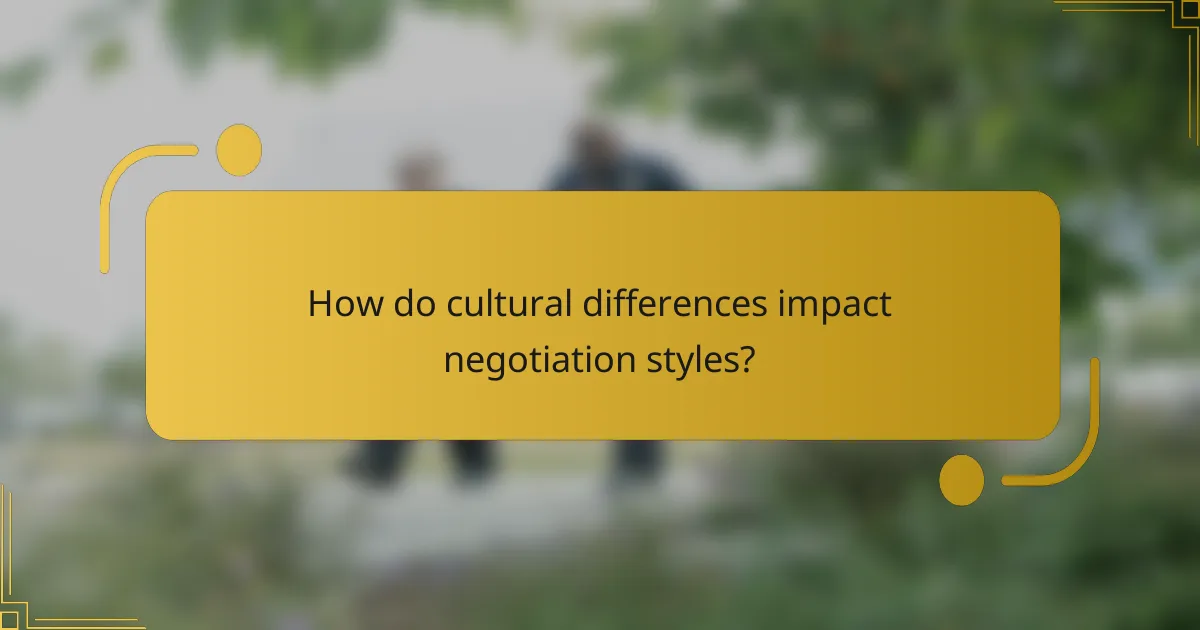
How do cultural differences impact negotiation styles?
Cultural differences significantly influence negotiation styles by shaping communication preferences, decision-making processes, and conflict resolution approaches. Understanding these variations can enhance negotiation outcomes and foster better relationships across diverse backgrounds.
Understanding cultural norms
Cultural norms dictate how individuals perceive authority, time, and relationships, which are crucial in negotiations. For instance, in collectivist cultures, group consensus may take precedence over individual opinions, while in individualistic cultures, personal achievement is often prioritized. Recognizing these norms helps negotiators tailor their strategies accordingly.
Additionally, some cultures may emphasize indirect communication, valuing subtlety and context, while others prefer directness and clarity. Being aware of these differences can prevent misunderstandings and facilitate smoother negotiations.
Adapting communication styles
Effective negotiation requires adapting communication styles to suit the cultural context of the other party. For example, using formal titles and polite language may be essential in cultures that value respect and hierarchy, such as Japan or South Korea. In contrast, a more casual approach might be acceptable in cultures like the United States or Australia.
Non-verbal communication also plays a vital role. Understanding gestures, eye contact, and personal space preferences can enhance rapport and trust. For instance, maintaining eye contact is often seen as a sign of confidence in Western cultures, while in some Asian cultures, it may be perceived as disrespectful.
Negotiation etiquette across cultures
Negotiation etiquette varies widely across cultures and can significantly impact the negotiation process. In many Middle Eastern countries, establishing personal relationships before discussing business is crucial, while in Western cultures, the focus may be more on the deal itself. Being aware of these expectations can help negotiators build rapport and avoid offending their counterparts.
Additionally, understanding the appropriate timing for negotiations is essential. In some cultures, punctuality is a sign of respect, while in others, a more relaxed approach to time is acceptable. Familiarizing oneself with these etiquette norms can lead to more successful negotiations and lasting partnerships.

What role does preparation play in successful negotiations?
Preparation is crucial for successful negotiations as it equips you with the knowledge and strategies needed to achieve your goals. A well-prepared negotiator can anticipate challenges, understand the other party’s needs, and respond effectively to various scenarios.
Researching the other party
Understanding the other party is vital in negotiations. Research their background, interests, and previous negotiation styles to gain insights into their motivations. This knowledge allows you to tailor your approach and find common ground.
Utilize various sources such as company websites, news articles, and social media to gather information. Pay attention to their recent projects or challenges, as these can provide leverage during discussions.
Setting clear objectives
Establishing clear objectives is essential for guiding your negotiation strategy. Define what you want to achieve, including your ideal outcome and acceptable alternatives. This clarity helps you stay focused and make informed decisions during the negotiation process.
Consider using the SMART criteria—Specific, Measurable, Achievable, Relevant, Time-bound—to formulate your objectives. This structured approach ensures your goals are realistic and attainable.
Anticipating counterarguments
Anticipating counterarguments prepares you to address objections effectively. Identify potential concerns the other party may raise and develop responses that counter these points. This proactive strategy can strengthen your position and demonstrate your preparedness.
Practice role-playing scenarios with a colleague or friend to refine your responses. This rehearsal can help you respond confidently and calmly when faced with unexpected challenges during negotiations.
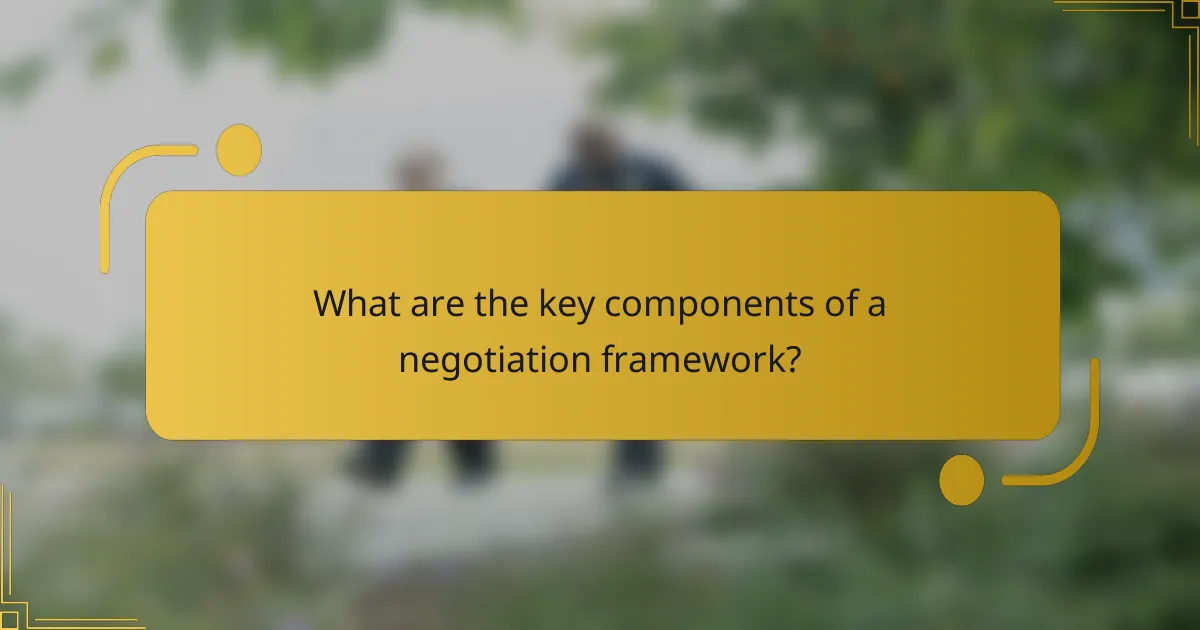
What are the key components of a negotiation framework?
A negotiation framework consists of several essential components that guide the process toward a successful outcome. Key elements include understanding interests, establishing clear communication, and developing strategies for conflict resolution.
Identifying interests and positions
Identifying interests and positions is crucial in any negotiation. Interests refer to the underlying needs or desires of each party, while positions are the specific demands or statements made during discussions. Understanding both allows negotiators to find common ground and create mutually beneficial solutions.
To effectively identify interests, ask open-ended questions that encourage dialogue. For example, instead of simply stating a position, a negotiator might say, “What are your main concerns regarding this proposal?” This approach reveals the motivations behind each party’s stance.
Common pitfalls include focusing solely on positions rather than exploring deeper interests. This can lead to a stalemate. Instead, aim to uncover interests by actively listening and validating the other party’s feelings. This fosters a collaborative environment and increases the likelihood of reaching an agreement.

